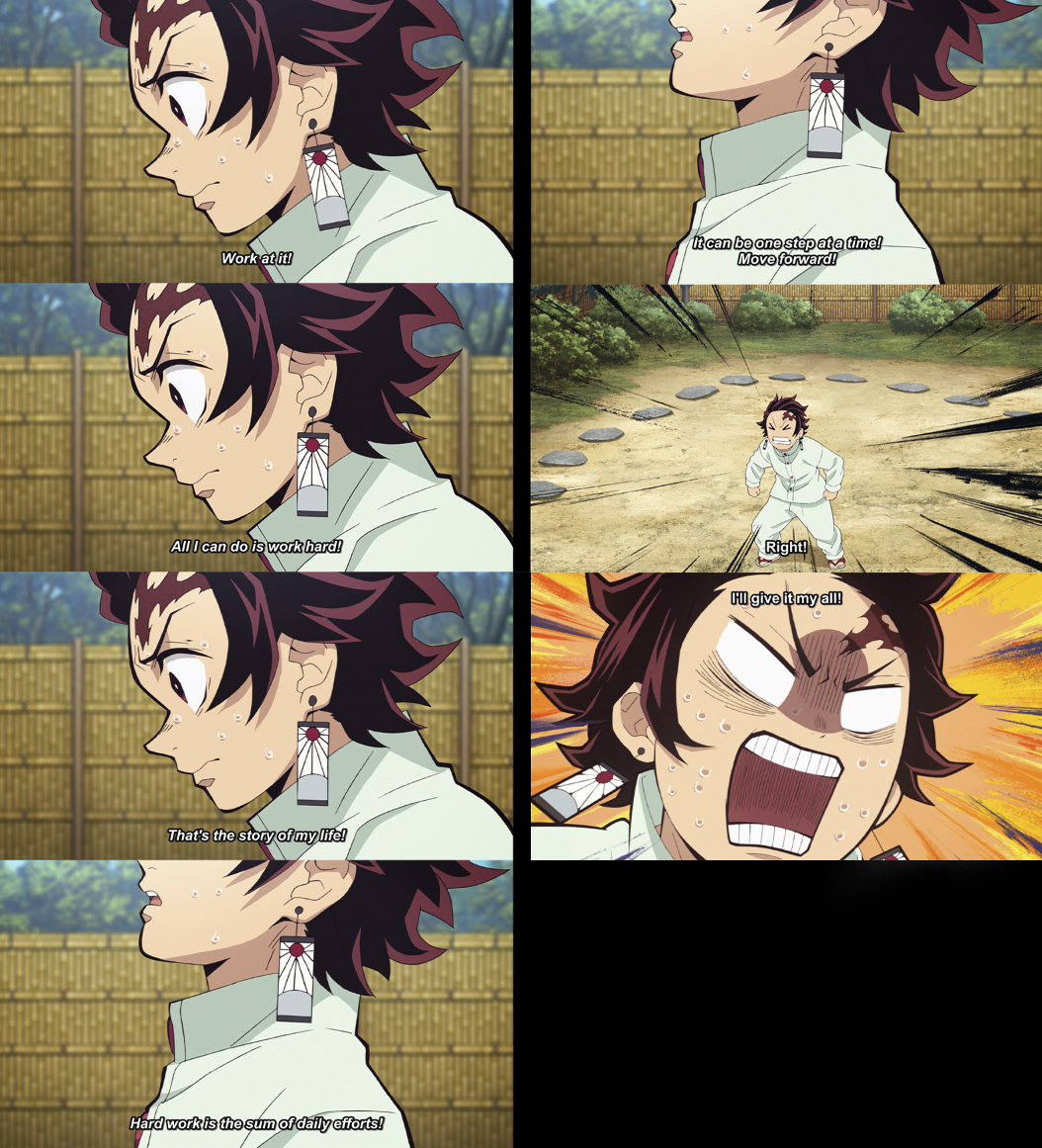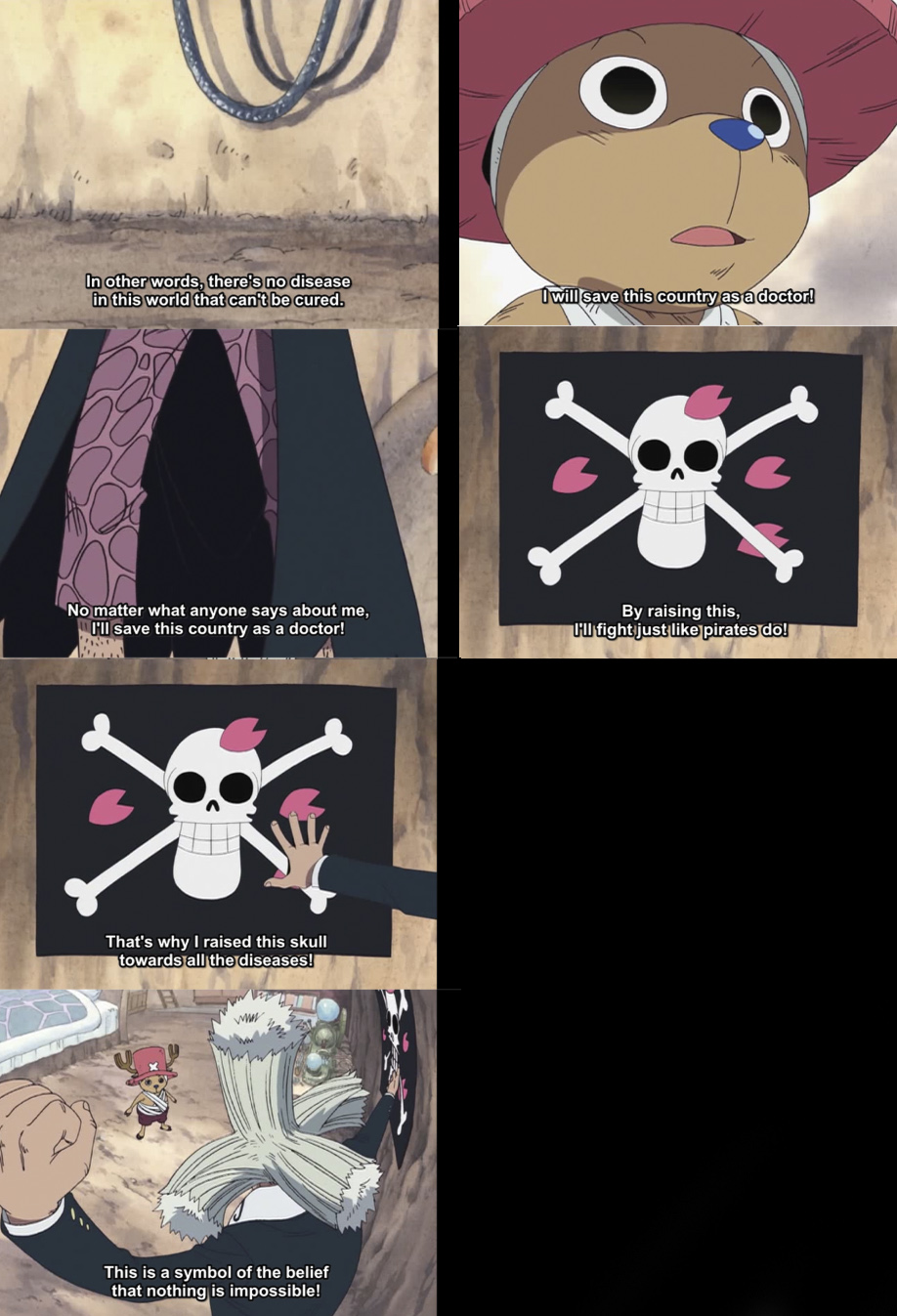Throughout millennia, Buddhism has been taught through stories and great works of art. The Lotus Sutra, for example, is a series of parables, like the story of Dragon King’s Daughter.
This is why the best anime can also teach us profound principles of life that resonate deeply with Buddhism.
Here are three Buddhist concepts explained through some awesome anime.
“Demon Slayer” and Bringing Out Our Best
In “Demon Slayer,” the courageous teenager, Tanjiro, undergoes rigorous training to become a demon slayer so he can protect his youngest sister, Nezuko, who turned into a demon.
In season one, Tanjiro fights to master a difficult breathing technique. Realizing the large gap that lies between his current condition and the skill necessary to wield the technique, he makes this inspiring determination.

Tanjiro
Buddhism teaches that one way to bring out our Buddhability is to exert all-out effort in each moment. The 13th-century Buddhist reformer Nichiren Daishonin notes,
If in a single moment of life we exhaust the pains and trials of millions of kalpas, then instant after instant there will arise in us the three Buddha bodies with which we are eternally endowed.
The Record of the Orally Transmitted Teachings, p. 214
A kalpa is an extremely long period of time (think billions of years). This is a colorful way of describing the amount of effort we have the capacity to apply in each moment of life. Essentially Buddhism teaches that if we give our all to confront each of life’s problem, we’ll find unlimited creativity and wisdom within.
Exerting all-out effort and taking action are how we can discover our true potential.
Buddhist philosopher Daisaku Ikeda writes:
The important thing is to take that first step. Bravely overcoming one small fear gives you the courage to take on the next one. Make goals, whether they are big or small, and work toward realizing them. You must be serious about and dedicated to your goals—you’ll get nowhere if you just take them lightly. An earnest, dedicated spirit shines like a diamond and moves people’s hearts. That is because a brilliant flame burns within. If we are sincere, people will understand our intentions, and our positive qualities will radiate. It is pointless to be caught up in outward appearances. The German poet Johann Wolfgang von Goethe (1749–1832) writes: “How may one get to know oneself? Never by contemplation, only, indeed, by action. Seek to do your duty, and you will know at once how it is with you.”
Discussions on Youth, pp. 101-102
Hiriluk From “One Piece” and the Bodhisattva Vow
Hiriluk from “One Piece” is an eccentric doctor who originally was a selfish thief. After he was diagnosed with a fatal illness, he believes he was cured by a vision of cherry trees in a distant land. After facing his illness, he has a complete change of heart. Feeling a deep sense of gratitude, he makes a vow to become a doctor who can cure any disease in the world.

Hiriluk
Hiriluk’s vow goes beyond curing people of physical diseases, but also diseases of the heart such as greed and anger. As a result of his vow, Hiriluk becomes the best version of himself, someone who is courageous and compassionate.
Buddhism teaches that deep within our hearts we have made a Bodhisattva vow. This can be described as a vow to lead all people to enlightenment, a vow to rid the world of misery.
How do we lead others to happiness? The Buddhist approach is very unique. We believe that our personal problems and difficulties are the tools we have to inspire others. In other words, we are not just overcoming painful ordeals in our lives just for our own benefit, but we are also doing it to inspire those around us. We are essentially showing others, you can really breakthrough this and happiness is possible in this difficult world.
From his perspective, we go from feeling that we simply were dealt a bad hand in life to understanding that there is a deep meaning to each of our problems, and we can use them to light the way for other people.
Daisaku Ikeda writes,
Those who have awakened to their mission as Bodhisattvas of the Earth fear nothing. When we take on the mission to help others become happy, courage and strength well up spontaneously from within us.
Awakening to our Bodhisattva vow brings out the best in ourselves and gives us the strength to overcome any situation.
Luffy From “One Piece” and Having a Great Teacher
Luffy is the heartbeat of “One Piece.” A young person full of ideals, he is determined to become a pirate king, which for him means to live a life of freedom and to make the world a better place.
In this scene, Luffy shares his determination to become a pirate king with the person that embodies all of his great ideals, Gol D. Roger.
The teachings of Buddhism have endured for over thousands of years and continue to come alive because of the bonds between people. There are no supernatural people in Buddhist history, but there have been amazing teachers who share Buddhism not only through their words but their behavior.
Daisaku Ikeda writes:
I would like to confirm that Buddhism is distinguished by the fact that it is a teaching focused on human beings. A Buddha is an awakened human being—a person, just like the rest of us. The person who is first to awaken to the Law (the Buddha) teaches that Law, seeking to elevate the lives of all human beings. In that respect, the true relationship between the Buddha and ordinary people is not like that between a god and human beings but a relationship between teacher and student, between mentor and disciple.
Brandon Nicholson, in this video, shares what finding a great teacher can look like in our everyday life.
In One Piece, Luffy chooses Roger as his mentor because he’s moved by Roger’s behavior and spirit to create a better, freer world. Ikeda goes to share what this looks like for Buddhists, saying:
The joy of encountering a rare person of great character, an individual who awakens us to what we are seeking in the depths of our beings—this is the mentor-disciple relationship. The correct teaching of Buddhism is transmitted through such human bonds.
For Buddhists, a great teacher isn’t just someone we look up to, a great teacher is someone who inspires us to see the greatness in ourselves.
Making a vow to work for the happiness of others, having a great teacher, giving it your all—anime gets real deep. Whenever anime strives to describe the depths of the human condition, it will find resonance with Buddhism.
Do you have a favorite anime that can explain a Buddhist concept? Email us and let us know! We can include a few of your suggestions in the next article on Buddhism and anime.
